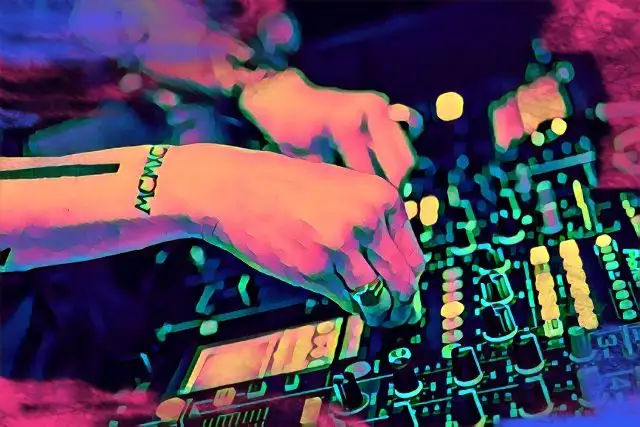Of the people actively involved in music, DJs are the ones most focused on their audience. This comes as a refreshing fact, bearing in mind that some of the music composed during the 20th century was quite detached from the human experience, so those who love music (basically the entire world) has gained a ton with the rise in popularity of this truly masterful artistry.
Wanting to become a DJ is hence directly connected to wanting to become part of a scene, a community. Whether it be playing one's own music or only music made by others, the dj works on building and maintaining an ambience, serving the noble purpose and directly influencing the general atmosphere at the party.
Regardless of whether hardware-based or entirely based on DJ software (with the latter being primarily an option for the less experienced), there is no doubt that the sole purpose of the craftsmanship is to touch the hearts of those present. An art form inspired by the people and developed for the people. Just beautiful!
The Club
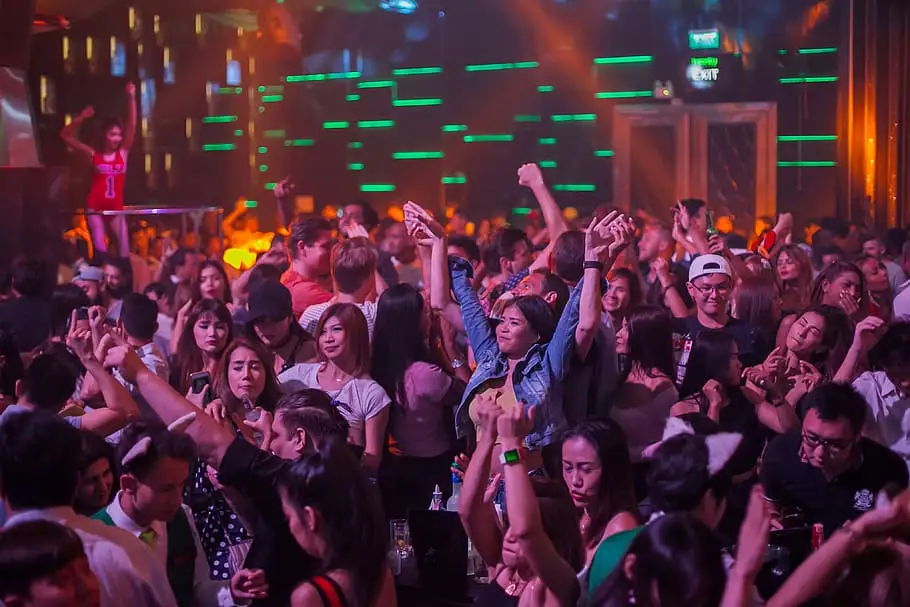
It's no wonder that everything DJing-related is initiated "in the club". While radio DJs can be a source of inspiration too, DJing skills are more closely demonstrable and attested at a party.
And where would one go to see DJs perform anyway, other than the local clubs (at least in the beginning). Sure, one could just go to YouTube and check out some set as recorded during a festival somewhere. But how about experiencing the crowd? Is that not relevant?
Ambience
Not only is the crowd relevant, but in a certain sense it's more relevant than the music itself. Cause an experienced DJ will react to what's in front of them, and the crowd in turn will reward the effort accordingly.
The sound quality will certainly be top notch, yet it's not enough for one to just play music, as the audience is there to have some good time. Playing gigs then, for the DJ has a social side which differs significantly from (say) a contemporary classical music concert.
The Folk
Visiting the clubs inspires the people who share the same passion to sort of make a "league of their own". It is no wonder then, that a DJing enthusiast will meet other DJs of different skill level, solely by regularly attending the local clubs.
Sometimes, simply trying to guess the next song brings ideas of mixing tracks previously thought not mixable (at least in a given sequence and context). Just sharing those thoughts and ideas with the people you met in the club makes for a nice basis, a cornerstone for starting to explore and build the skills necessary DJing skills.
The Genre(s)
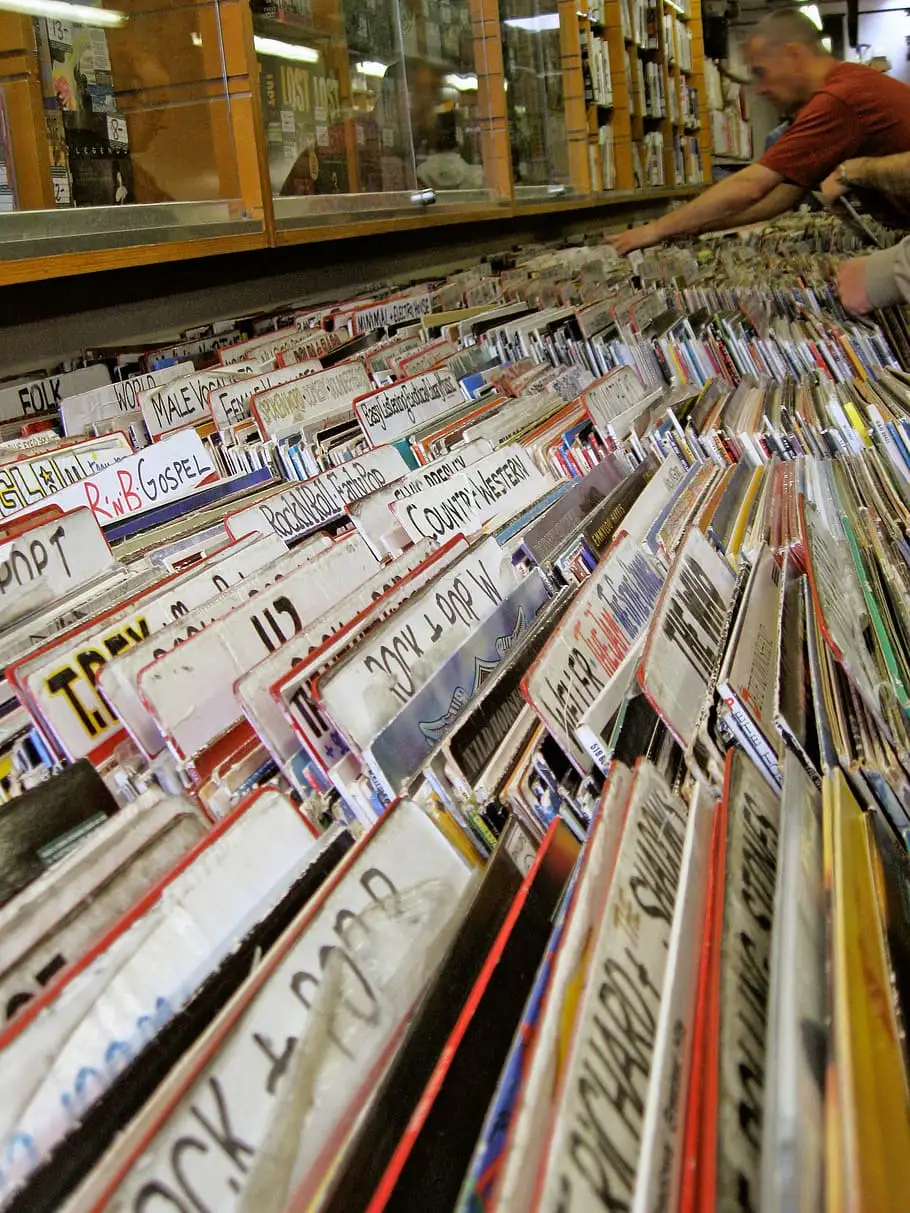
People sometimes have genre preferences at the beginning, which are sort of set in stone. It's fine to have preferences of course, but modern DJs are called "modern" because they kept an open mind. Music production removes boundaries and expands on the already known. DJing should always follow.
Listening to what's happening elsewhere (as in other genres) is of instrumental importance for one who wants to become a DJ. Curiosity is an invaluable habit for any DJ, regardless of their experience level. It's literally the difference between progress and stagnation.
Choose
The above noted doesn't mean that one ought not choose a genre; just that choosing shouldn't mean dogmatizing. Just as knowledge of (say) classical music theory does not affect one's potential and understanding when it comes to different musical styles.
One might say that a DJ's job is to blend tracks. Well, that sounds like the tip of an iceberg, at the bottom of which stands the genre choice. To become a DJ then, one needs to build the iceberg from the basis up, and then climb to its top.
Do Not Isolate
Another important point in the context of genre is that one can pick multiple genres as their core preference. There isn't anything which would slow down the process or alter the learning curve for beginner DJs in this sense. If you like two or more genres, feel free to hit the dance floor and knock yourself out first.
Digital music, one might say, is a sort of "genre" in its own right. Thus, it's no wonder that there are close relationships between the genres. After all, the concept of genre and subgenre has been introduced to facilitate the understanding, rather than separate and isolate the influences.
The Music Library
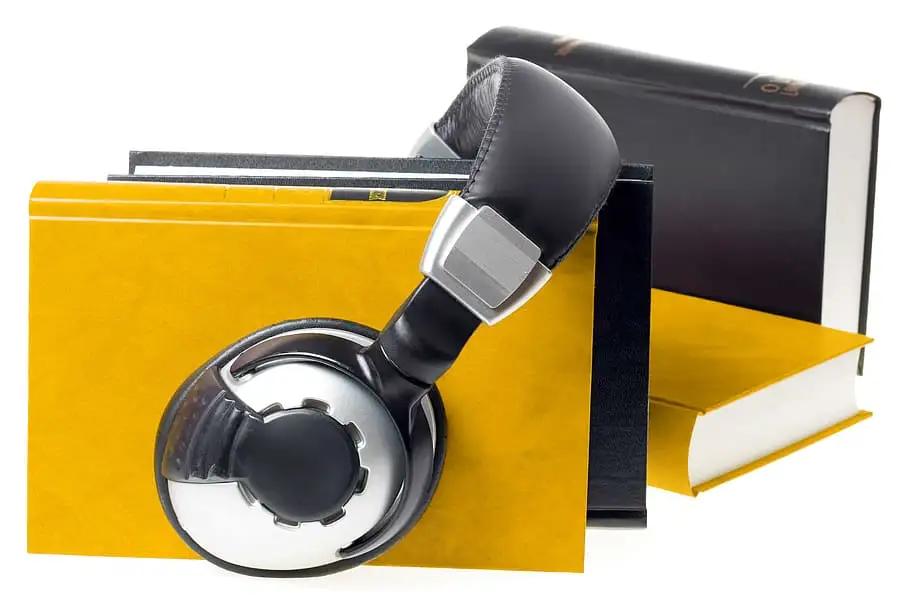
Before starting to practice DJing, one certainly needs to obtain a music library (what would they mix without having one anyway). The options at hand are numerous, and at times will depend on the genre(s) the DJ picked or the scenes themselves.
As an art form, music isn't fixed as the hardware is. Even DJ software gets updated regularly, though it's advisable for the DJ to stick to their original choice, at least for a while. The library on the other hand, will need to get updated on an ongoing basis.
Own Music?
Sure. Not necessarily though; let's remember that being a DJ isn't the same as being a producer. Music production may follow along with DJing, though it isn't a necessary follow up for one who simply wants to become a DJ.
It is fine therefore, if the DJ enthusiast includes their own music within the DJ music collection. However, it shouldn't have a special place or dominate in any way. Remember: it's only there to enhance the experience for both the DJ and the audience.
USB Drive
Nowadays it's much more simple to get hold of the music and/or samples needed for DJing. From own music, through totally free stock samples to fairly cheap DJ pools available online for a monthly subscription, the options are limitless.
Just download and put what you need on a USB drive and the library is all set. Again: feel free to create music and feature your own tracks in the set. Just don't feel obliged to do so.
Physical Copies
Many DJs are nostalgic about what I like to call "the-back-in-the-day chronicles". Be it hip hop, house music and even electronic dance music, a skilled DJ (especially one who's been active for many decades) will at times prefer vinyl records or CDs.
It goes without saying that the physical music records are fine and have an irreplaceable place in DJ history. However, actively using a physical music collection for DJing purposes might be demanding for the budget (and, dare I add: the back and spine also).
Gear Options
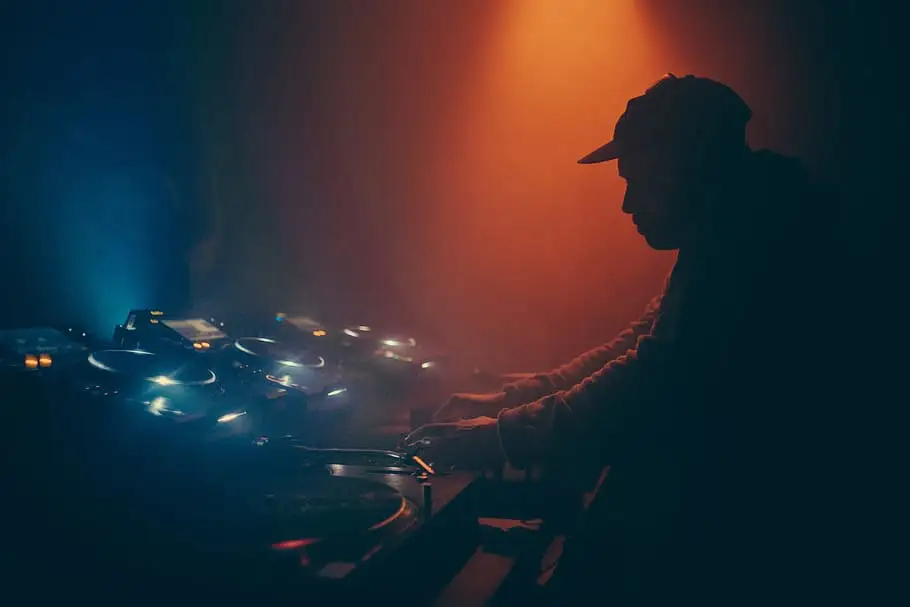
The gear one chooses to opt for typically depends on their skill level. A beginner DJ normally will opt for controllers, whereas a more experienced one typically prefers CD decks or even turntables. The budget is also a factor, of course.
All the way from your USB drive, your laptop (phone, iPad...) to midi controllers, each gadget has it's role and purpose, assisting in learning how to DJ. Thankfully, unlike producing gear whose updates never end, the DJ typically reaches a goldilocks zone at one point in time.
Laptop & DJ Software
A beginner can start the journey with simply a laptop, some free software and basic DJ equipment. The bedroom DJ who really struggles financially might be forced into such an approach initially. Alas; that's not a reason to be backing off!
Many options are available when it comes to DJ software. Some DJ tools are free, though most commercial software aren't overly expensive either. Check out Traktor, Virtual DJ or Serato (to name but a few).
DJ Decks & Turntables
Turntables were the only option since the very beginning up until the mid '90s. Since then, decks are considered the bread and butter of DJing, especially since most feature a USB port, so the music doesn't need to be played from a vinyl or CD any longer.
As noted above, many DJs will still opt for vinyl records or even CD decks without a USB port. The audience isn't there for the technical stuff, so whatever a DJ prefers is fine, so long as their sets are mixed and played in the most masterful of ways.
DJ Mixer
For those who will opt for decks or turntables, the mixer is also a part of their standard DJ equipment. While mixing music in the context of professional music producing requires owning an expensive multichannel and multi port mixers, things are much simpler for a DJ.
Typically, what's needed is only a portable mixer with two channels, where the effects are also more loosely defined and less present. For example, the EQ only consists of three knobs most often (low, mid and high).
Standard DJ Controllers vs All-In-One DJ System Controllers
Less experienced DJs can choose to go for a controller instead of the standard 2 deck + mixer setup. Today, even stand-alone system DJ controllers are available, bypassing the need of a laptop and DJing software.
A simple DJ controller has less options than the system controller, yet that might be just what one is after initially, in order to avoid confusion. Some bedroom DJs for example, might prefer the standard DJ controller, combined with their iPad and some freeware. Research in detail and choose wisely.
DJ Headphones
Just as the mixer differs significantly from the one a producer will use, so do the DJ headphones, compared to a producer's headphones. Typically their sound will be somewhat "refined", as in being punchier and inclined towards the transients.
Club DJs will typically opt for phones with sweat protection and noise cancellation. Any DJ would need to avoid the noise, yet in the club it's a different story altogether. The professional DJ world is typically after: lightweight, punchier sound, sweat protection, noise cancellation.
Speakers
To begin with, standard monitor speakers will do. Many options here, but generally speaking, the speakers used for production can be used for DJing too. The audience's experience will certainly not be reproduced in its entirety, but a good part of it will.
DJ skills will be developed even if using just monitors. Yet, if possible, pick one track and compare the sound of monitor speakers to the one a club sound system would provide. The difference is at times overwhelming..! So, whenever possible, make use of a club's equipment.
Audio Interface
Use an audio interface , even if used for archiving purposes only. Beginners will benefit from it especially, since the sets recorded with it will be useful for analysis and improvement.
The DJ journey can go from start to finish with the simplest of audio interfaces. A fancy and expensive one would sort of stand in the way almost, cause it'll weigh more to begin with and would feature many options, none of which is relevant for DJing. Keep it simple.
Knobs, Sliders & Techniques They Are Used In
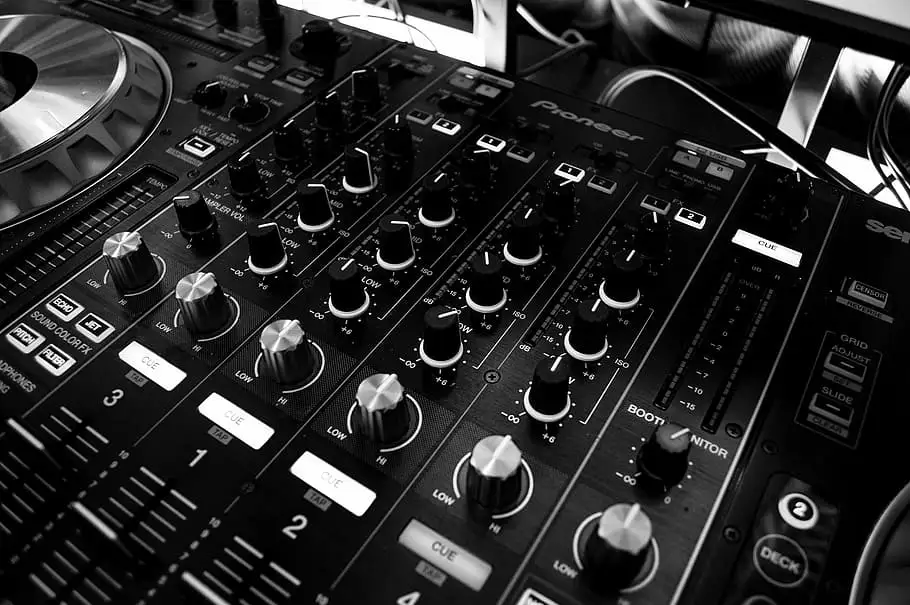
The beginner DJ might go for an entirely digital setup (i.e. just a laptop and DJ software + headphones). Yet, the software's interface will closely resemble the layout of a standard DJ hardware setup, so speaking of knobs and sliders will certainly not bring confusion.
To become a DJ, the aficionado will need to learn some glossary and ways to achieve the desired effects. Thankfully, albeit endless when it comes to nuancing, DJing is less saturated with endless verbal phrases, names and effects, when compared to music producing.
Tempo Controller
Gone are the days when dj Francis Grasso had to apply some "jogging" (i.e. manually induced beat-matching). Nowadays, most decks have "sync" buttons and the job is done automatically.
However, for the purpose of an elegant and original transition and - at times - simple historical reference, the tempo controller slider finds use, as the DJ will often want an audible tempo alteration when "moving on" towards the next track.
Cue & Play/Pause
Well, the play/pause button is self explanatory. The "cue" button on the other hand, serves the purpose of bypassing the master output, sending the signal to the monitoring device (typically to the earphones only).
Cueing is certainly a part of the necessary mixing skills when it comes to DJ techniques. It's a way to make sure in advance, to prepare the transfer before playing it through the master output. A transition between songs as intended would be impossible without it.
Volume - Gain Knobs
Volume control is an integral part of any DJ gear, be it hardware or software. That's the only feature which typically is present everywhere, as each gadget used has it's own volume control. In this particular context, we'll note a word or two about the most important ones, i.e. those found on the mixer.
The "gain" knob controls the loudness of the input as received. Any DJ school will prompt it's students very early on, to always bear in mind that the distortions caused by the gain can not be bypassed by simply lowering the channel fader. The gain is hence the only volume control which controls distortion. So, make sure to touch it first if/when clipping occurs.
Volume - Faders
Faders on the other hand control the overall output of the channel. This is important cause at times samples or even entire tunes can be of different quality or produced under a different music industry standard, thus resulting in one being more loud than the other, when controls are set to equal levels.
Channel faders help compensate by adjusting the actual loudness. The cross-fader on the other hand help the transitioning, as both channels are controlled by a single fader. This means that lowering one raises the level of the other - exactly what we're after during the transition's completion.
EQ
The equalizer serves here primarily as a sound effect, so detailed EQ nuancing would be sort of beside the point. DJ mixing focuses a lot more on drops and build ups than music production does, so the EQ defined through only three knobs achieves what the DJs are after.
The EQ also enables for a sort of "quasi transition" to be achieved, whereby during the drop, the DJ lowers the "mid" and "high" knobs to zero, resulting in a hardly definable muddy low end blend. With the song becoming barely recognizable, the simple turn of the knobs in the opposite directions can work wonders, especially when aligned with the onset of the chorus.
The Rest
When it comes to "the rest" of the buttons and effects, one could not only write a book but a multiple-tome edition for each. And even then some research would need to be made cause both the gear and the skills never stop evolving.
DJ software, and nowadays even the hardware enable for looping, sampling, comb filtering and almost everything imaginable to be assembled from scratch and brought forward by the simple push of a button. Make sure to read the hardware/software manual. Many times over!
To close the knobs and sliders section, I'll note something completely unrelated to them: harmonic mixing. Entirely based on music theory, this technique takes into account the key (tonality) of the themes between which the transitioning is to take place. Note that music pieces can be transposed or "aligned" by key, by making use of pitch shifting plug-ins .
The Practice Sessions

Experienced DJs never forget to point out that success is the product of experience, which in turn is based on live performances and practising at home. To become a DJ one needs to practice DJ mixing whenever time allows it.
The DJ equipment is actually first bought in order for the necessary knowledge to be gained. After all, performing in front of a crowd requires for strong background and understanding. Intuition alone and being tech savvy alone won't do (certainly not at the beginning anyway).
Favorite Techniques
Beginner DJs will often make the mistake of spending too much time on their favorite transition technique for example. That creates a sort of disparity between the balance of skills, which is certainly to be avoided.
It is of utmost importance for aspiring DJs to balance out their DJing "toolkit" and then expand further based on it. Many DJs will note that the process resembles an architecture of sorts, where each line matters. A DJ is hence a constructor in a way (though their construction isn't palpable).
Record
While technically not a part of the live performance, recording is essential for learning and tracing the overall progress. A DJ setup when it comes to gear should hence feature an audio interface, as mentioned above.
By revisiting recent and even older recorded DJ sets, one gets to see what can be added or subtracted, enhanced or simplified. Even if for sake of nostalgia and emotions, most DJs will agree that listening to their old attempts is - at the very least - truly inspirational.
From Enthusiast to Professional DJ
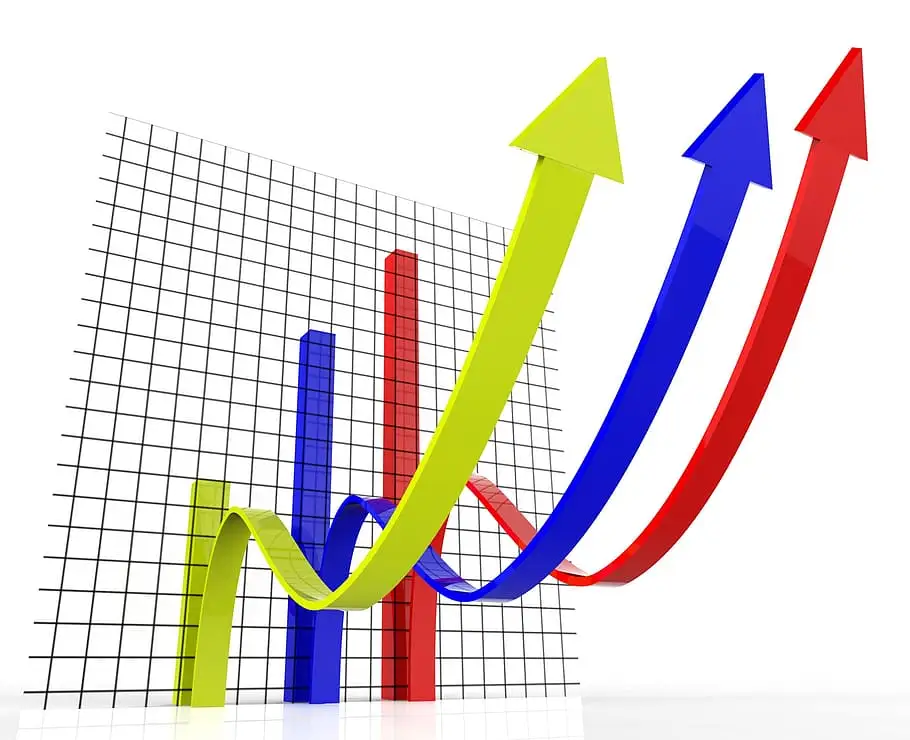
The road from a bedroom DJ, through self-organized house parties to becoming a professional DJ might sound overly challenging at first. Yet, let us not forget that superstar DJs were beginners at one time too.
Before the onset of the nightlife as defined by attending live DJ sets, radio DJs were the only resource in the context of listening, analysing and learning. Today, one just needs to be active and attentive on the scene and on social media , and in due time the road will take them where they aim to arrive.
The First Gigs
Having gained the know-how when it comes to (the basics of) DJing, the DJ career of aspiring DJs typically sets off at the local club. What was initially just checking out sound effects and turning knobs to oblivion is now on the road to becoming a mastery. Kudos!
As most will agree, determining what to charge for the first gigs will depend on many factors. The genre, the scene, the competition; even the year's season matters. A DJ needs patience hence, as what they are after when it comes to earnings is still a long way away.
Experience as a Form of Salary
When starting up in public, it's important to bear in mind that the process of learning is still the top priority. The DJ plays music in front of the local scene for the first time and a lot of surprises will be populating the horizon.
Playing music in front of an audience provides a place and space to practice the live performance, gaining confidence and experience, which are of utmost importance for a professional mobile DJ. Once mastered, these skills will skyrocket the career.
The Professional
There comes a time when, though aware that a lot still can be learned, a DJ will look into their schedule and realize that they have regular appearances and performances, whereby they are able to charge quite a substantial amount and make a very decent living from their DJing.
When a DJ realizes that they are busy, some different skills and mindsets start bearing more and more importance. The ability to keep things organized and schedules well managed becomes more important than ever before. Of course, these alone are not to be considered top priorities, for if done at the cost of the overall well-being, it would be best to rethink and reorganize things altogether.
Keep in mind that psychophysical balance is the top priority at any stage! Otherwise, if professionalism in DJing comes at the price of deteriorating health, it seems that returning to the bedroom would be the best (and possibly the only reasonable) choice!
A Word In Conclusion
DJing is more than DJ software, hardware, the sets and even the music. It's about the mark a DJ leaves in the community on the one hand, and in the historical context on the other, broadly speaking. The passion is more important than its source.
DJing is - and will remain to be - an art form! The DJ community contains DJs of all levels and backgrounds. Some stick to vinyl records, some play a musical instrument, some even married the resident club DJ whom they fell in love with back in the day.
A DJ continues to dream, even when on the top of the world. Martin Luther King wasn't a DJ, but DJs have a lot in common with him, in the most noble of ways. Cheers all!


